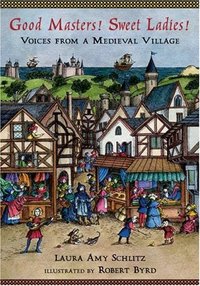Good Masters! Sweet Ladies! Voices from a Medieval Village is a 2007 children's book written by Laura Amy Schlitz. The book was awarded the 2008 Newbery Medal for excellence in children's literature.[1]
 | |
| Author | Laura Amy Schlitz |
|---|---|
| Language | English |
| Published | July 24, 2007 Candlewick Press |
| Media type | Print (Hardcover, paperback) |
| Pages | 96 |
| Awards | Newbery Medal |
| ISBN | 0-7636-1578-1 |
| OCLC | 53178700 |
| 812.6 | |
| LC Class | PS3619.C43 C55 2007 |
Overview
editInstead of the typical narrative structure, the book is constructed of a series of monologues, each spoken by a young member of a medieval village. Each character has a monologue with the exceptions of Petronella and Jacob, and Mariot and Maud, who have dialogues. The book was originally written to be performed by fifth-grade students at the Park School of Baltimore, where Schlitz is a librarian. It contains nineteen monologues and two dialogues, with the characters ranging from a runaway boy to the lord's daughter.[1]
Monologues/Dialogues (in order of appearance)
edit- Hugo, the Lord's nephew
- Taggot, the blacksmith's daughter
- Will, the plowboy
- Alice, the shepherdess
- Thomas, the doctor's son
- Constance, the pilgrim
- Mogg, the villein's daughter
- Otho, the miller's son
- Jack, the half-wit
- Simon, the knight's son
- Edgar, the falconer's son
- Isobel, the Lord's daughter
- Barbary, the mud slinger
- Jacob Ben Salomon, the moneylender's son and Petronella, the merchant's daughter
- Lowdy, the varlet's child
- Pask, the runaway
- Piers, the glassblower's apprentice
- Mariot and Maud, the glassblower's daughters
- Nelly, the sniggler
- Drogo, the tanner's apprentice
- Giles, the beggar
Critical reception
editAccording to Kirkus Reviews, "Schlitz takes the breath away with unabashed excellence in every direction."[2] Deirdre F. Baker wrote in The Horn Book Magazine, "Byrd's pristine, elegant pen-and-ink illustrations in opulent colors make the book almost too visually appealing, belying the realistically dirty, stinky conditions described in the text."[3] John Schwartz, in The New York Times, called Schlitz a "talented storyteller" and praised the book for its frank depiction of the Middle Ages.[4] Nina Lindsay, chair of the Newbery Medal committee, called the monologues "superb" and stated that as a whole, they "create a pageant that transports readers to a different time and place."[5]
In 2008, Anita Silvey, author of 100 Best Books for Children, described Good Masters! Sweet Ladies! in a School Library Journal article as one of several recent Newbery winners considered "particularly disappointing" by public librarians. Silvey "criticized the Newbery selections as too difficult for most children."[6][7] Writing for Slate, Erica S. Perl responded to this criticism, saying that while her younger self might not have enjoyed the subject matter or archaic language, her "inner drama geek" would have enjoyed the theatrical elements.[8]
References
edit- ^ a b Thompson, Bob. "Children's Book Award Winners Break The Mold." The Washington Post, 2008-01-15, p. C1.
- ^ "GOOD MASTERS! SWEET LADIES! by Laura Amy Schlitz, Robert Byrd". Kirkus Reviews. July 15, 2007. Retrieved January 23, 2017.
- ^ Bircher, Katie (June 6, 2013). "Reviews of books by Robert Byrd". The Horn Book Magazine. Retrieved January 23, 2017.
- ^ Schwartz, John (December 16, 2007). "You Are There: 1255". The New York Times. Retrieved January 23, 2017.
- ^ "2008 Newbery Medal and Honor Books". American Library Association. Retrieved 5 August 2010.
- ^ Silvey, Anita (October 1, 2008). "Has the Newbery Lost Its Way?". School Library Journal. Retrieved June 21, 2017.
- ^ Rich, Motoko (January 26, 2009). "'The Graveyard Book' Wins Newbery Medal". The New York Times. Retrieved January 23, 2017.
- ^ Perl, Erica (19 December 2008). "Captain Underpants Doesn't Need a Newbery Medal". Slate. Retrieved 5 August 2010.